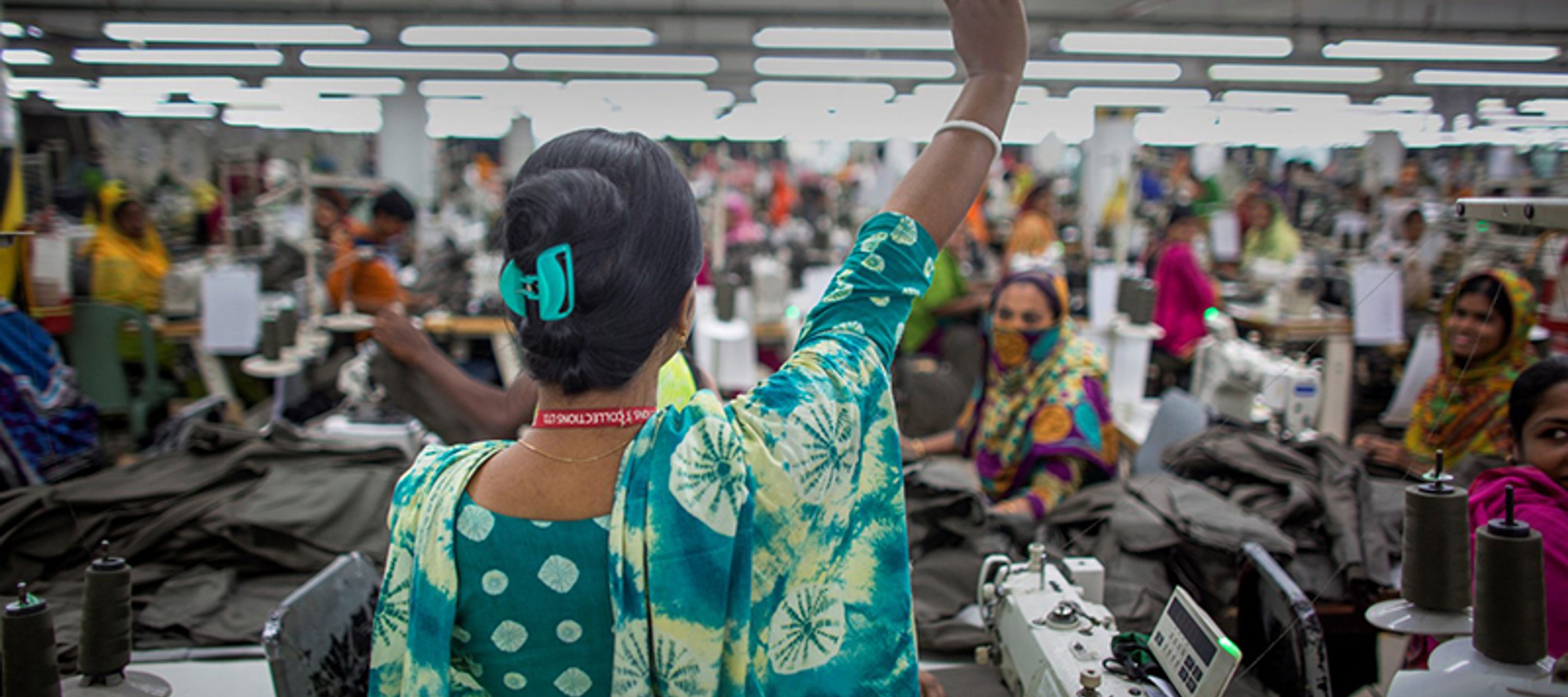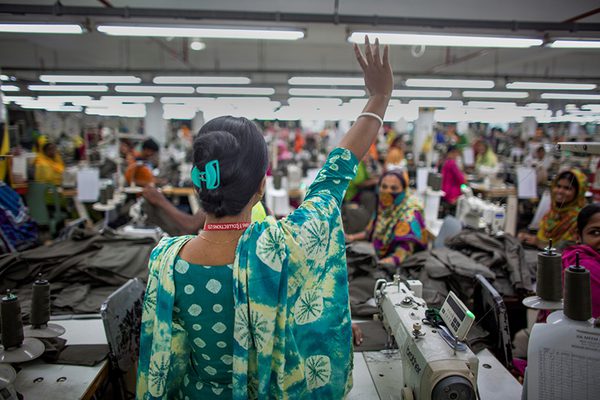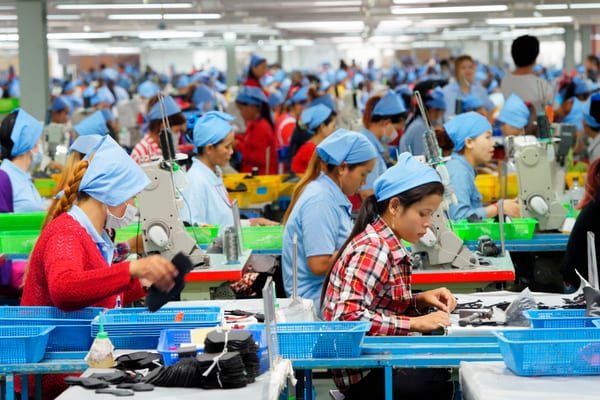How the Pandemic is Affecting Bangladesh’s Garment Workers
28 April 2021

The readymade garment (RMG) industry employs millions of workers in Bangladesh and has contributed to the nation's development. The COVID19 pandemic has had a devastating impact on the sector as malls and factories had to close and still today workers continue to face uncertain futures. As Bangladesh enters its second lock-down, it is crucial that the right lessons are learned to mitigate harm to the most vulnerable.
On 29 April 2021 the Institute for Human Rights and Business (IHRB) and the Subir and Malini Chowdhury Center for Bangladesh Studies at the University of California, Berkeley, launched a report in Dhaka, Bangladesh, at a virtual event. The report evaluates global retailers’ response to the pandemic and its effect on Bangladesh garment workers through in-depth interviews with major international brands, Bangladeshi suppliers, local labour leaders, and international civil society, and provides recommendations that may help avert future crises.
The report, published with the support of the UNDP Business and Human Rights in Asia (B+HR Asia), the UNDP Bangladesh Country Office, and the Swedish International Development Cooperation Agency, is drawn from a timely study of global retailers’ response to the COVID-19 pandemic and its effect on Bangladesh garment workers.
The report covers three main topics:
- The structure of the readymade garment (RMG) industry in Bangladesh;
- Stakeholders’ responses to the pandemic and the subsequent impact on workers; and
- Expectations of the industry going forward and recommendations for international brands, suppliers, the government, and international community and consumers.
The report comes less than a month after the Bangladeshi government, in an attempt to contain a rise in the spread of COVID-19, instituted a new 7-day lockdown on April 5th. Sectors associated with export-oriented industries, and mills and factories, were allowed to remain open during that time, with the expectation that health safety measures would be maintained. The RMG industry accounts for approximately 80% of Bangladesh’s total exports, so it is no surprise the government made exceptions to avoid disruption.
The country’s significant dependency on the RMG industry serves as a cautionary case study for how businesses impact the decision making of governments and the well-being of its citizens, and of their responsibility to respect human rights and to demonstrate that they do so through ongoing human rights due diligence processes.
COVID Caused Chaos Across Global Supply Chains
The country’s significant dependency on the RMG industry serves as a cautionary case study for how businesses impact the decision making of governments and the well-being of its citizens, and of their responsibility to respect human rights and to demonstrate that they do so through ongoing human rights due diligence processes.
International apparel brands have largely shifted their production of clothing from the industrialised north to the global south, creating millions of jobs and providing a path for workers into the waged economy. But lax enforcement of the limited regulations that exist to ensure workers are fairly treated and compensated means that workers in this industry remain extremely vulnerable. As could have been expected, the global pandemic had catastrophic consequences for many workers in the RMG global supply chain, including Bangladesh.
In the United States alone, nearly $100 billion in retail spending disappeared in March 2020, and apparel retailers were receiving projections indicating that they should expect a 79% decrease, or $17 billion dollars less revenue in April 2020 compared to April 2019. In response to this precipitous drop in demand, many brands started cancelling orders with suppliers.
82% of Bangladeshi workers interviewed said their income in April-May 2020 was less than in February 2020. 77% said it was difficult to feed everyone in their household. 69% said they ate less protein-intensive foods during that time.
Between early March 2020, when factory owners in Bangladesh started reporting receiving notices from brands to delay shipment of orders, and by the end of April 2020, approximately $3.2 billion USD worth of orders had been suspended or revoked. By the end of May 2020 Bangladeshi workers had lost nearly 30% of their wages, estimated at $502 million. The dramatic economic shock experienced by workers resulted in serious compromises in consumption and asset depletion.
In a UC Berkeley-BRAC study from mid-2020, 82% of the Bangladeshi workers interviewed said the income they had in April-May 2020 was less than the income in February 2020. Some 77% said it was difficult to feed everyone in their household and 69% of the workers ate less protein-intensive foods (meat, fish, eggs, and milk) from February to May.
What Brands Need to Do in Times of Crisis
The power dynamics between brands, suppliers, and workers strongly favour the brands over the suppliers, leaving suppliers with limited capacity to negotiate terms. Workers lack good systems for representation on issues of substance to them and are therefore largely at the mercy of the industry’s push to keep costs as low as possible to satisfy consumers demand for fast fashion.
Although brands did not go as far as to provide direct financial assistance to workers, there are good examples of responsible business practices exhibited by brands during the pandemic, including:
- Providing information about health and safety best practices
- Intervening on behalf of suppliers to enable liquidity for their operations
- Negotiating with suppliers to understand their situation
- Accepting goods that they had contracted to buy
- Paying the suppliers for goods they had contracted to buy
- Monitoring and auditing the situation in factories
All parties – Bangladesh government, international agencies, brands, suppliers, and unions – have a role to play.
As we consider what conditions business will operate under in the coming year, and how to prepare for future crises, the Weakest Link report urges the importance of learning from the experiences of 2020: place the worker first; ensure worker safety; establish protection mechanism for the workers in case of job losses; create financial mechanisms to ensure that liquidity is maintained; intervene early and act proactively to establish meaningful dialogue between affected parties. All parties – Bangladesh government, international agencies, brands, suppliers, and unions – have a role to play.
Data and quotes in this post are drawn from, “The Weakest Link in the Global Supply Chain: How the Pandemic is Affecting Bangladesh’s Garment Workers” (April 2021), unless indicated otherwise.
Image: Flickr/ILO Asia Pacific
Resources on this topic:
- IHRB, The Weakest Link in The Global Supply Chain: How the Pandemic is Affecting Bangladesh’s Garment Workers. May 2021.
- Forthcoming Literature Reference Guide to be published as an annex to The Weakest Link report.
- Forthcoming book to be published in 2021: “How the Pandemic has Impacted the Various Layers of the Global Garment Supply Chain,” on Confronting the Covid-19 Pandemic While Protecting Human Rights (Morten Kjaerum, Martha Davis, Amanda Lyons, eds.), Oxon: Routledge/Taylor and Francis Group
- Lecture: The Garment Sector Unraveling in Bangladesh: Rethinking the Health, Safety, and Livelihoods of Workers During a Global Pandemic, Institute for South Asia Studies, UC Berkeley, 4 December 2020.
- Webinar: Business and Human Rights in the Textile and Garment Sector during COVID-19. 2nd UN South Asia Forum on Business and Human Rights, 17 March 2021,
- Saxena, Sanchita Banerjee. Beyond the Accord. The Daily Star, 24 April 2021.



